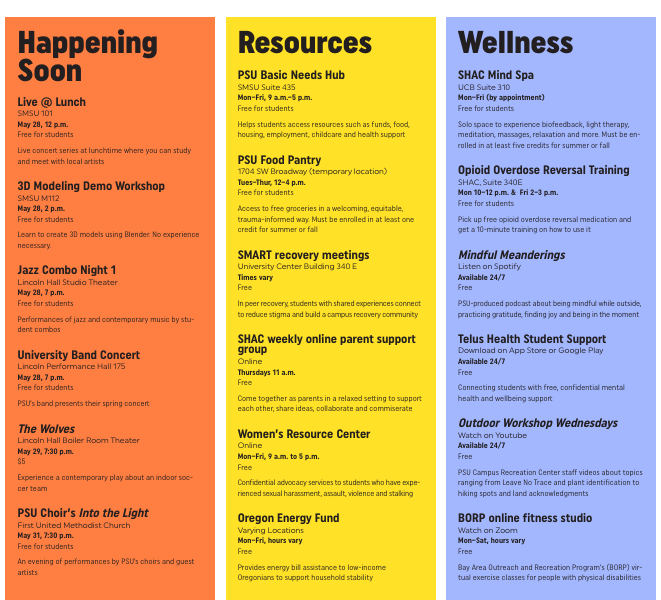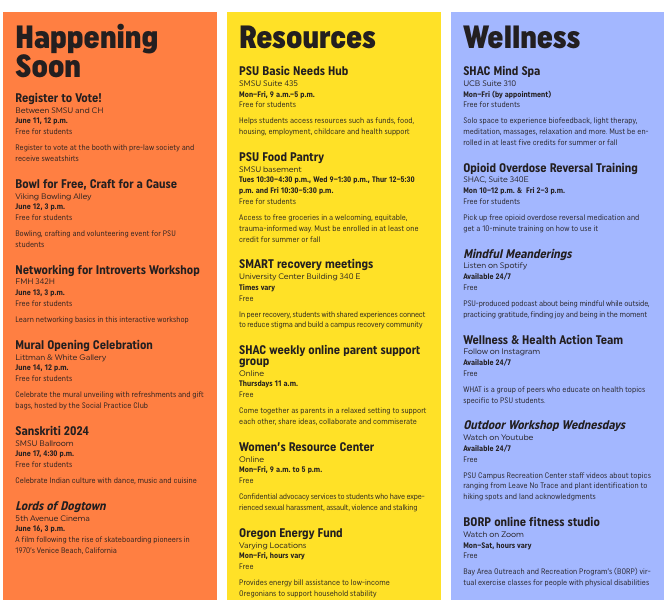Project Rebound is an organization of formerly incarcerated students at Portland State. Despite facing challenges both academically and personally, the members pursue goals centered on offering resources to other formerly incarcerated students, giving them a voice, and defeating the stigma surrounding them.
“There are many stigmas associated with formerly incarcerated students,” says Michaela Loggins, a PSU student involved with multiple organizations on campus. “My goal is to bridge a gap between the populations while bringing awareness to the makeup of our student body.”
Lisa Guirsch, a student who was among the first to use Project Rebound services and now works for them, said the fear of others prevents many students with recent criminal records from accessing many of the same resources as students with no records.
Preceding Project Rebound, the PSU Higher Education in Prison program (HEP) is a primary resource for incarcerated students. The HEP program continues to provide individuals actively experiencing incarceration with the opportunity to enroll in university courses, with the ultimate goal of integrating into the PSU campus after release.
This was how Guirsch first became involved with the university. Guirsch was incarcerated when she came across fliers offering inmates the chance to enroll in college courses.
“It was during the last year of COVID,” Guirsch said. “We hadn’t had any visitors and hadn’t seen our families, religious services or anything. And somehow, PSU got their foot in the door to do this.”
Enrolling in classes was the first step in a significant journey Guirsch would take involving the university.
Arthur, then director of the HEP program, would go on to ask Guirsch, along with her partner Rachel Guirsch and another formerly incarcerated student, Keisha Johnson, to build a program that offers resources, services, and a community to formerly incarcerated students on campus. They aimed to model it after the Project Rebound program in California.
Guirsch said that the stigmatization of incarcerated people presents itself in tangible ways. Guirsch cited often running into difficulties securing housing for formerly incarcerated students.
“We’ve been trying to get campus housing, but told no,” says Lisa. “They just aren’t willing to look at it on a case-by-case basis… they don’t want a bunch of felons congregating.”
Quoting Director of Residence Life Julie Robertson, Director of HEP Nahlee Suvanvej stated in an email to PSU Vanguard that the situation was more nuanced.
“PSU Campus Housing considers the applications of formerly incarcerated students,” Suvanvej stated. “When students submit their housing application, they are asked to disclose if they have any felony convictions. If noted yes, then they are routed to a separate form that gets reviewed for approval on a case-by-case basis by the Executive Director.”
Guirsch points to Portland’s probation system and the places that they place formerly incarcerated people as a significant hurdle to success.
“When you’re released from prison, they put you wherever it is that they want to, and they’re usually not the nicest places to be,” said Guirsch. “You’re coming from the jail, and you’re put right back with the same people that you fell with.”
Guirsch reminisced on a friend of hers who died by suicide after relapsing on drugs while on probation. She claimed the system of probation was the principal cause of their emotional decline.
Guirsch notes the immediate exposure to crime, as well as the fentanyl crisis, to be inconducive to reducing recidivism.
According to a report authored by the Oregon Criminal Justice Commission Statistical Analysis Center, arrest rates for formerly incarcerated individuals on probation varied upwards of 11.7% from 2006 to 2016, an upward trend that is significantly less common than arrest rates from individuals released without parole.
Dismantling stigma and advocating for better living conditions is one of Project Rebound’s larger missions, but they also have short-term goals.
According to Rachel Guirsch, they are working on building connections with other universities around the country.
“It’s about building a sense of community,” she said. The theme of community comes up quite often in the conversations with members of Project Rebound, as it provides a reprieve from the harsh realities of life immediately after incarceration.
“We try to help people that come to Project Rebound, because let’s face it, life’s hard,” said Lisa. “But it’s even harder when you’re formerly incarcerated.”
Today, Project Rebound offers an ever-expanding range of services. The program provides students with essentials such as backpacks, laptops, school supplies, public transportation passes, and food vouchers. It also connects students with tutoring and offers a range of services that aim to help formerly incarcerated students readjust to society.
Notes from the editor:
The initial article stated that Project Rebound was an unofficial organization of formerly incarcerated students that was not recognized by the university. According to Nahlee Suvanvej, Director of HEP, it is in fact an official student support resource that is part of University Studies (UNST).
The initial article stated that “the PSU Higher Education in Prison program (HEP) was the primary resource for incarcerated students.” This was changed to “…is a primary resource…” for clarity.
The initial article stated that Project Rebound is an entirely separate organization from HEP. This was removed as it is false.
The initial article stated that formerly incarcerated students often run into trouble securing housing. An attribution to the source who claimed this was added.
A quote from the Director of HEP was included to provide multiple perspectives following the previous claim about formerly incarcerated students obtaining housing on campus.






